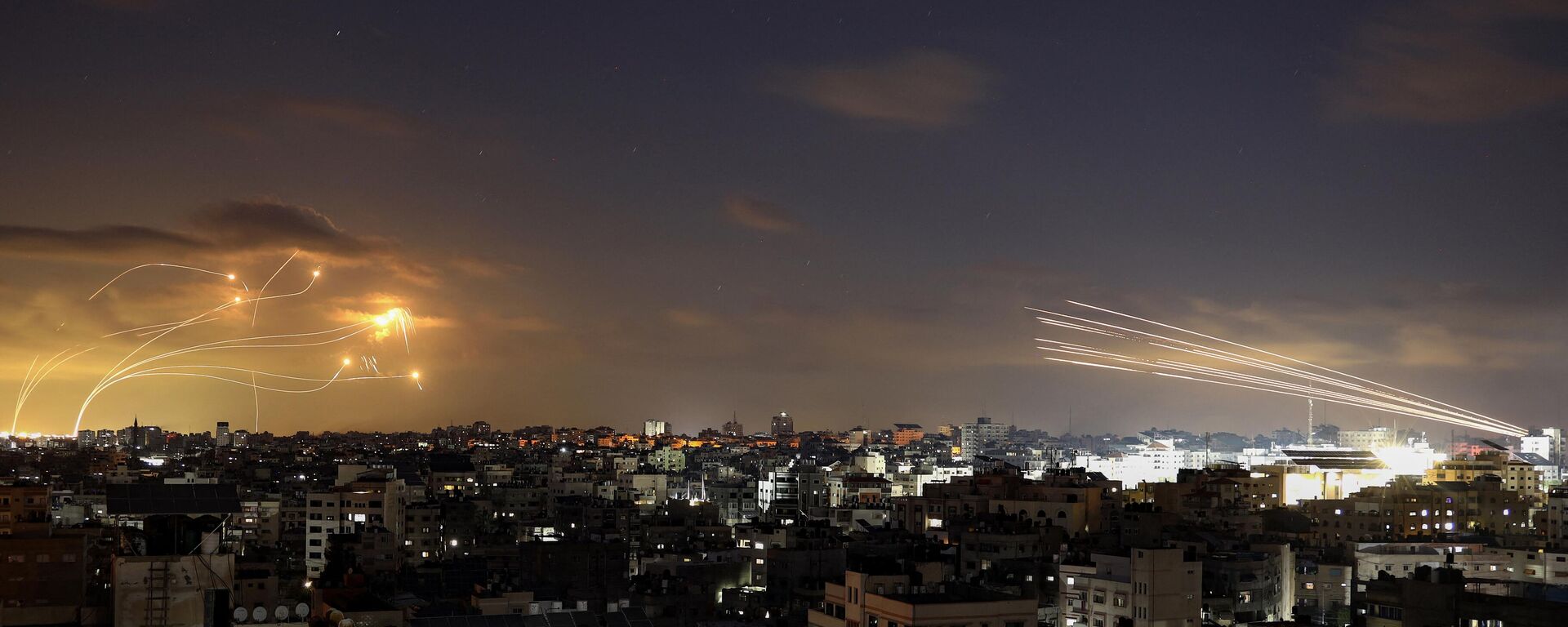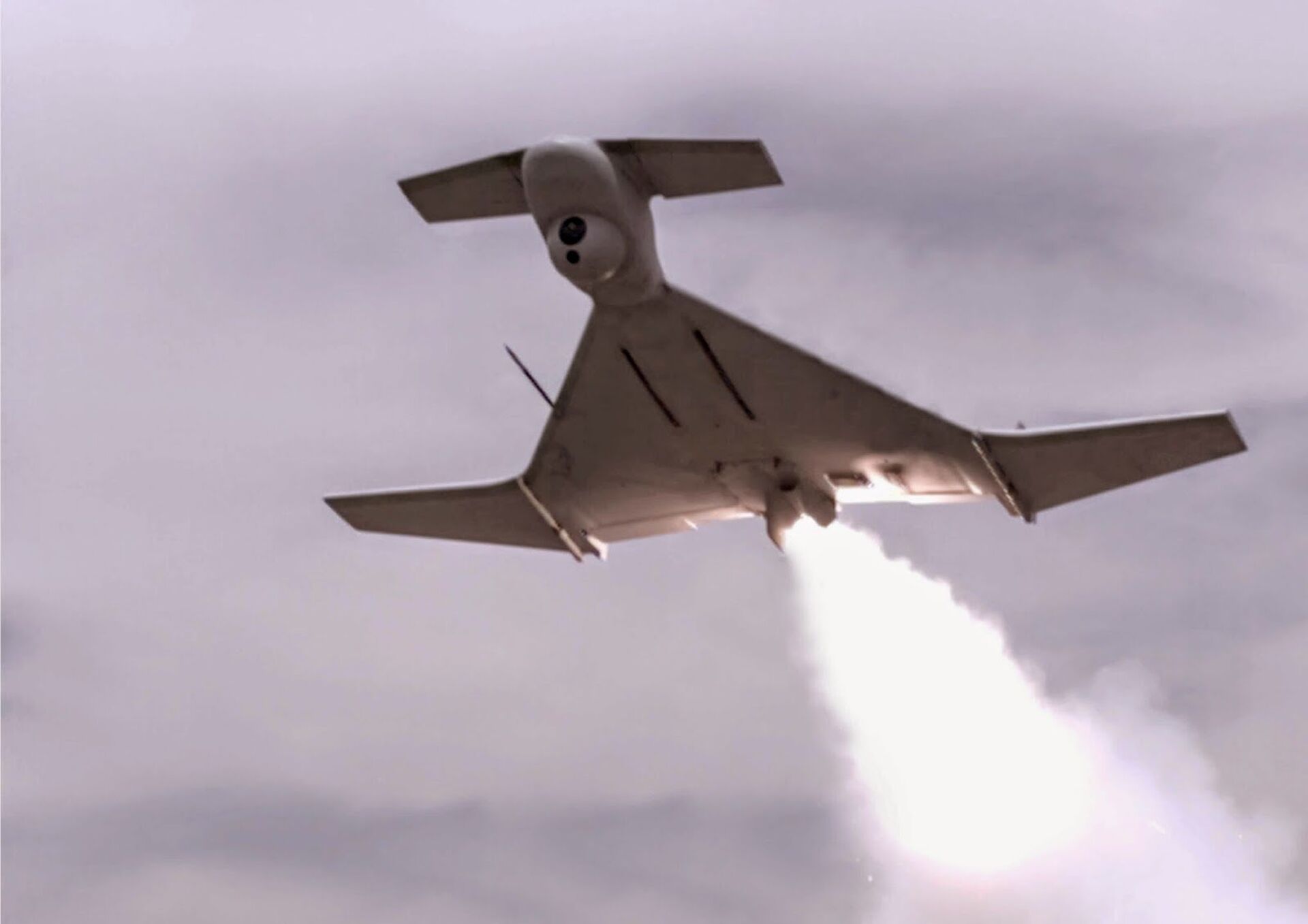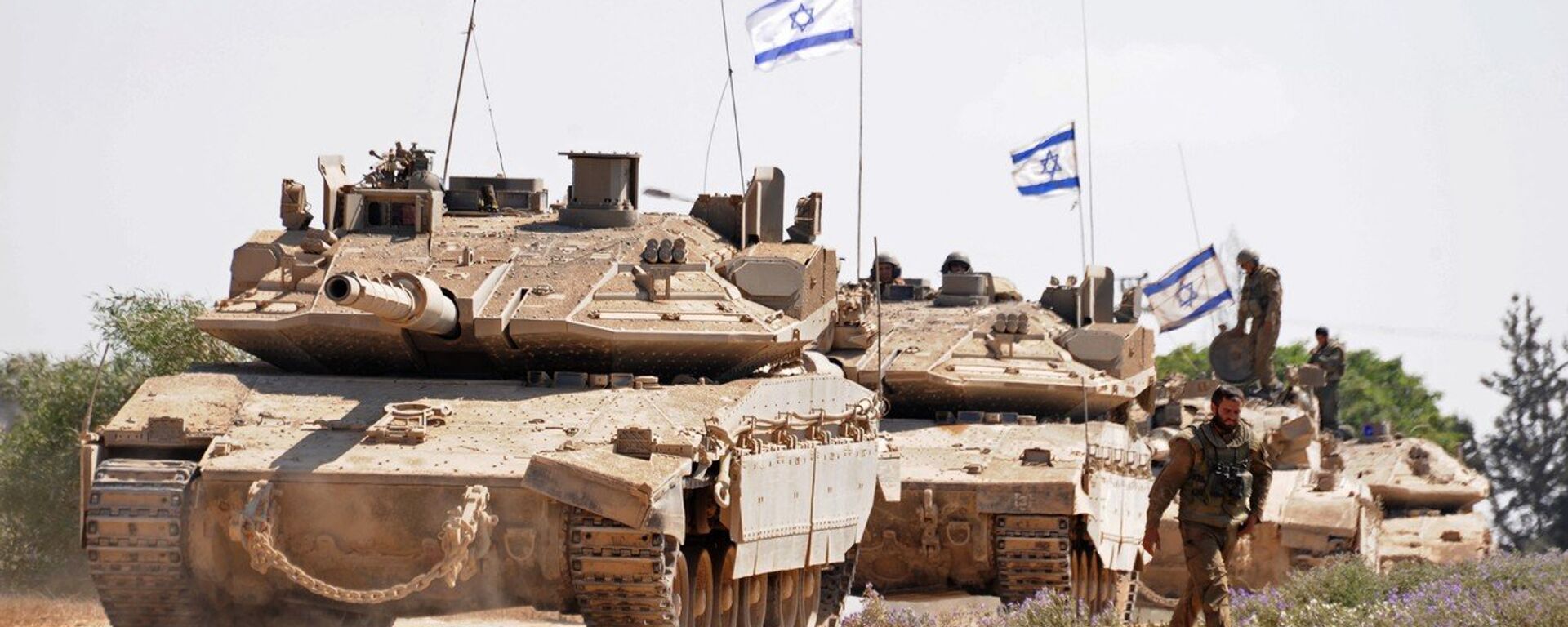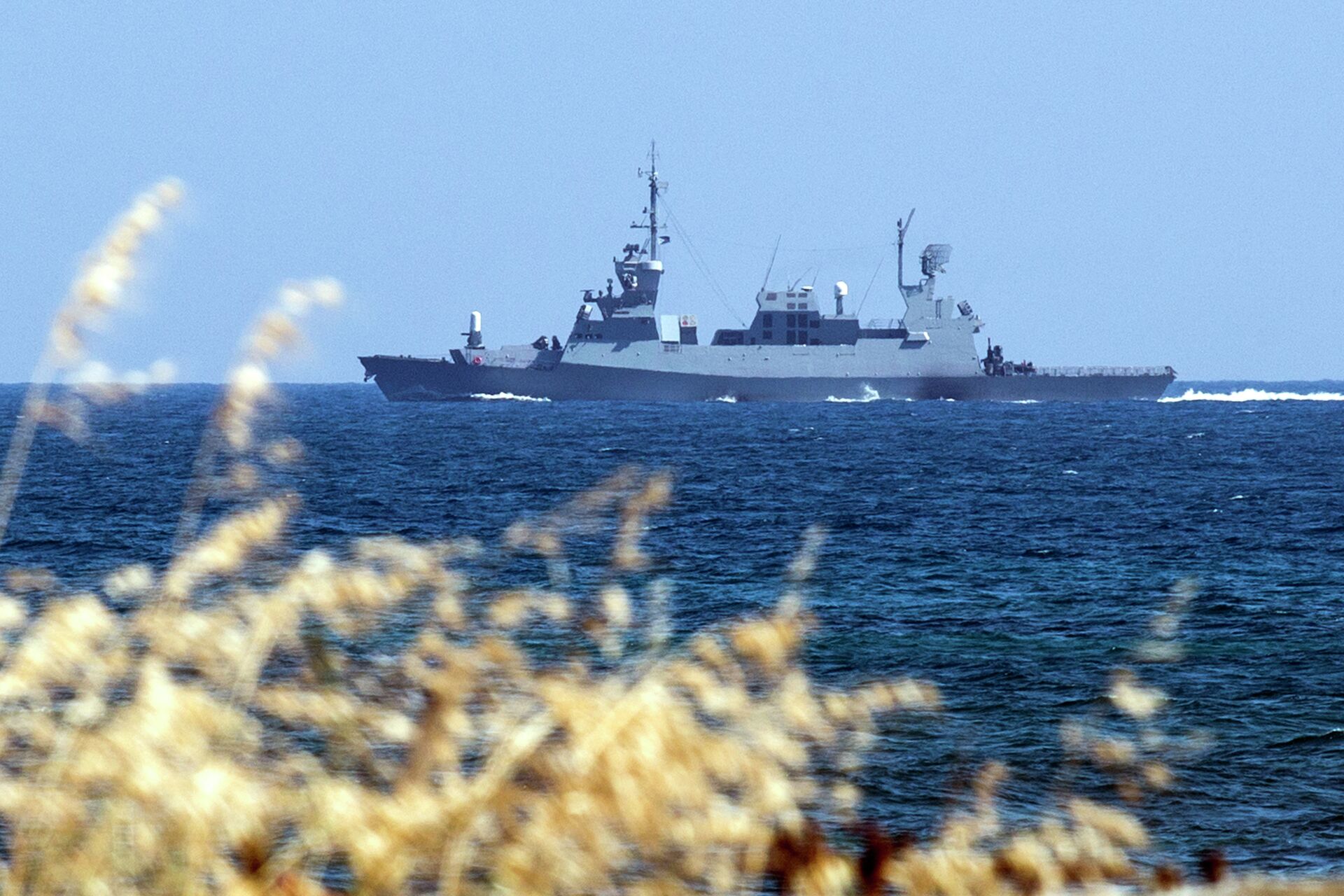Israel’s Defense Industry: Can Tel Aviv Survive Without American Weapons?
16:51 GMT 11.10.2023 (Updated: 10:27 GMT 30.01.2024)
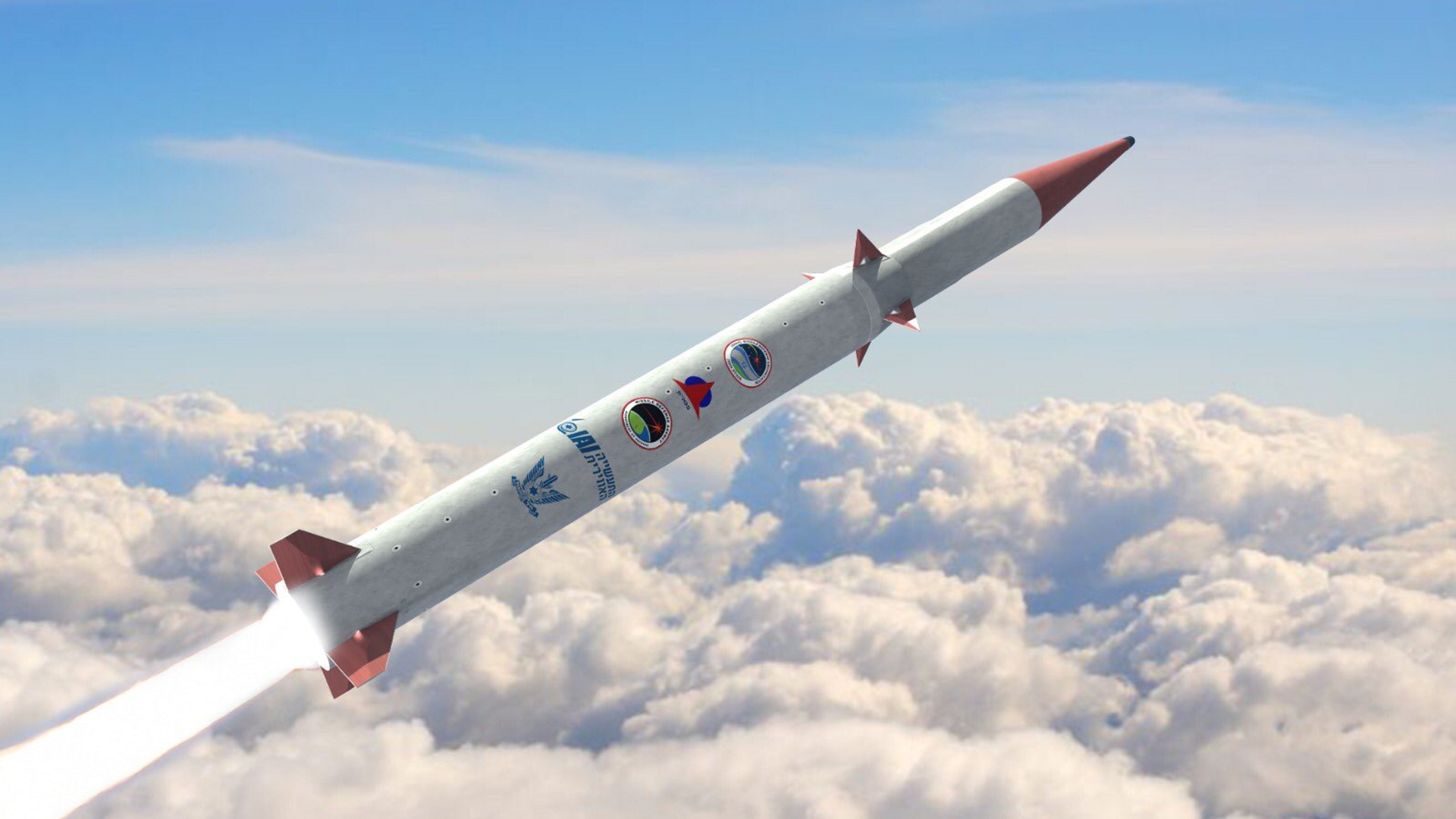
© Photo : Twitter / @Israel_MOD
Subscribe
The escalation of the Palestinian-Israeli conflict has underlined Tel Aviv’s potentially precarious security situation, with Washington’s focus on the proxy war against Russia in Ukraine sparking questions about whether the US can afford to back two allies at once. In this light, it’s worth taking a closer look at Israel’s domestic defense sector.
The Israel Defense Forces (IDF) confirmed late on Tuesday that the first plane carrying US weapons had touched down in the Holy Land.
“We are grateful for the US backing and assistance to the IDF…during this challenging period,” the IDF said in a statement. Stressing that Tel Aviv and Washington’s “common enemies know that the cooperation between our militaries is stronger than ever,” the IDF said the American support would “facilitate significant military operations and increase preparedness for other scenarios.”
The Israeli military did not elaborate on the nature of the weapons provided, nor what these "other scenarios" might entail. However, US President Joe Biden vowed that American assistance would include interceptor missiles "to replenish Iron Dome" - Israel's much-touted air defense system.
Alongside weapons, Washington demonstratively deployed the USS Gerald R. Ford Carrier Strike Group in the Eastern Mediterranean, and moved additional Air Force resources to the region “to augment existing fighter squadrons,” all to send a “strong signal of deterrence should any actor hostile to Israel consider trying to take advantage of this situation,” in US CENTCOM chief Michael Kurilla’s words.
The current situation is eerily reminiscent of a scenario Israel experienced exactly 50 years ago this week, when, during the Arab-Israeli War of October 1973, Washington organized a massive strategic airlift mission known as Operation Nickel Grass to funnel tens of thousands of tons of urgent aid to Tel Aviv, including ammunition, tanks, and artillery systems.
There is one important difference this time around, however. During the 1973 crisis, Israel’s Syrian and Egyptian adversaries enjoyed direct support from Soviet bloc countries, and expeditionary and advisory assistance from half-a-dozen nations in the Middle East. Today, while about half-a-dozen countries have expressed moral support for the Palestinian militias (among them Afghanistan, Iraq, Iran, Syria, and Hezbollah in Lebanon), none have provided military support.
Does Israel Actually Need American Arms?
Israel has one of the largest, most diversified, complex, and profitable military-industrial complexes in the world, with only Iran able to compete with the Jewish state regionally when it comes to the ability to design, produce, and field a broad array of advanced weapons systems. Unlike Iran, Israel also gets a booster of over $3 billion in annual US military aid, or more precisely, grants for the acquisition of US military equipment and services, plus first in the region (and often in the world) access to cutting edge US military tech, like Lockheed Martin F-35 fighter jets.
What Prompted the Birth of Israel’s Defense Industry?
Israel’s defense sector’s earliest roots lie in the 1930s in the British colony of Mandatory Palestine, where underground Jewish militants seeking to establish a Jewish state created secret underground weapons factories to produce small-arms and explosives, which would then be used to target the British colonial administration and Palestinians.
As in the case of Iran after the 1979 Revolution, necessity proved the mother of invention for Israel’s defense sector. French President Charles de Gaulle’s decision to put an embargo on weapons exports to the region shortly before the Arab-Israeli War of June 1967 crippled the Jewish state’s ability to produce an array of advanced weaponry and components, particularly aircraft. Paris lifted its embargo in the mid-1970s, but the damage was done, and Tel Aviv began an unprecedented, decades-long effort to build up the technical and production-related capabilities of its defense industry.
In recent years, thanks to a series of mergers, acquisitions, and large-scale expansions to foreign markets, Israel’s defense sector has come to be dominated by a handful of major weapons conglomerates responsible for the production of a broad array of weapons, among them:
Israel Aerospace Industries (IAI): A state-owned defense giant responsible for the production of an array of homegrown and conversion/derivative aircraft, drones, missiles, space-based defense systems, radars, and electronic warfare components. IAI’s best-known products include the Iron Dome, the Arrow series of anti-ballistic missile systems, Barak series surface-to-air missiles, Gabriel anti-ship missiles, Jericho I, II, and III nuclear-capable ballistic missiles, LAHAT anti-tank laser-guided missiles, Griffin laser guided bombs, and SkySniper air-to-surface missiles.
The company also produces the Dabur, Dvora, and Super Dvora Mk II and Mk III-series fast attack boats, designed for coastal anti-ship and air defense patrols. A broad range of unmanned aerial vehicles (UAVs) are produced by IAI, among them the Heron family of long-range spy drones, and Harpy and Harop loitering munition suicide drones.
IAI’s lineup further includes light armored reconnaissance vehicles, including the RBY MK 1 and RAM MK3, the TopGun artillery platform, and components for the IDF’s Caterpillar armored bulldozers, used extensively to demolish buildings, plant life, and obstacles in East Jerusalem and the West Bank, and to assist in the construction of walls and other barriers along the border with Gaza.
Rounding out the range of major systems produced by IAI are Israel’s AMOS-series lightweight communications series satellites, EROS-series spy satellites, and launch vehicles to carry the spacecraft into orbit.
Rafael Advanced Defense Systems: Another major state-owned defense and aerospace conglomerate, responsible for the creation of the Tamir series missiles used by the Iron Dome, elements of the experimental Iron Beam laser air and missile defense system, the David’s Sling air defense system (developed jointly with Raytheon), the Python-5, I-Derby, and Sky Spear series of air-to-air missiles, the Spike and Matador anti-tank missiles, Windbreaker Trophy active protection system for tanks, and an array of remote-controlled weapons platforms, including the Samson machinegun platform equipped on board IDF vehicles and pillboxes.
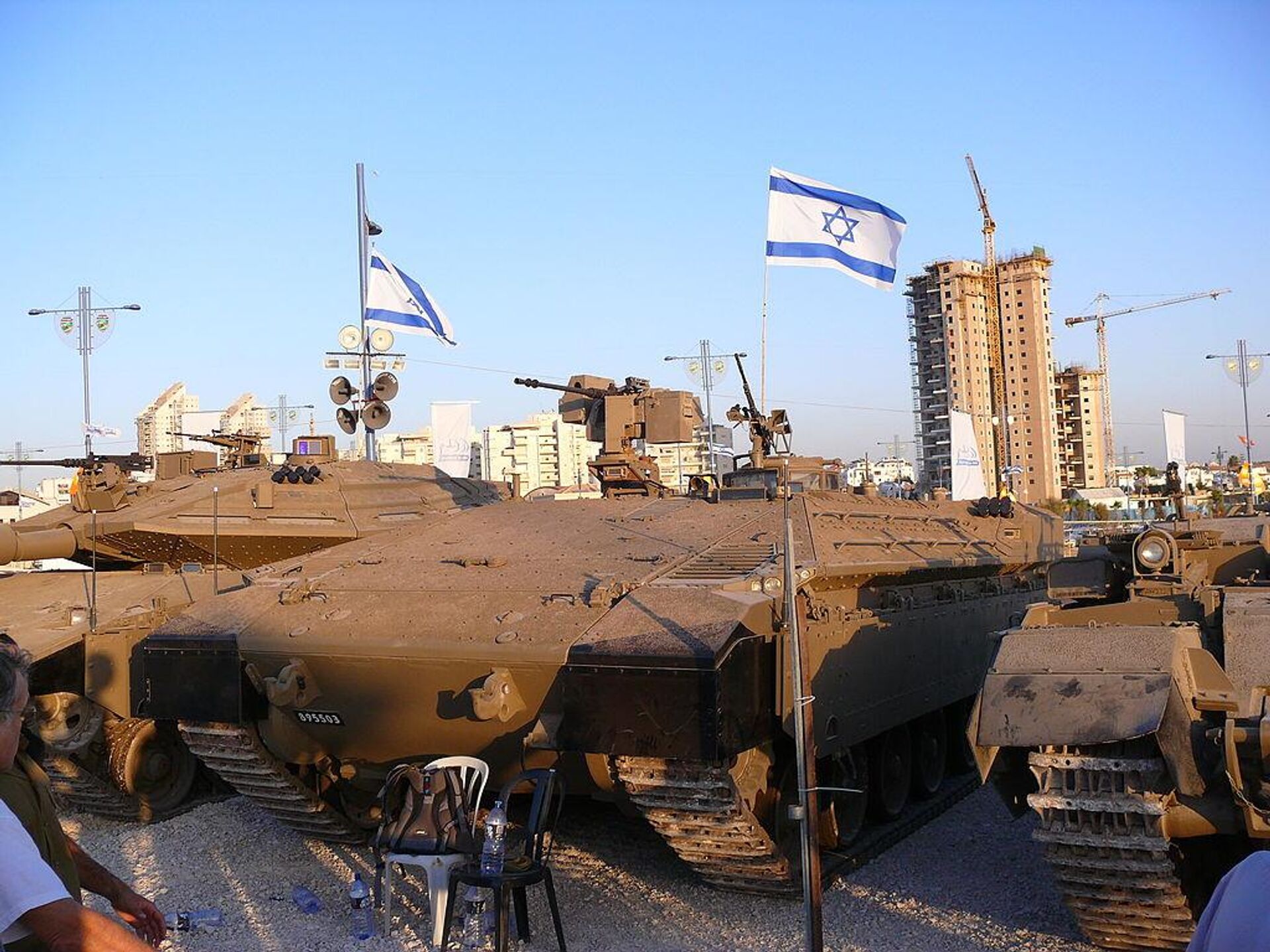
A Samson Remote Controlled Weapon Station, seen here welded to a Namer armored personnel carrier built on the Merkava Mark IV tank chassis.
© Wikipedia / MathKnight
Elbit Systems: A key defense electronics company producing much of the "guts" of Israeli weapons systems, including unmanned aerial vehicles and digital radio equipment. The company’s portfolio includes the production of the Hermes series of reconnaissance drones, E-LynX radios, spyware, and, after Elbit’s acquisition of Israel Military Industries (IMI) in 2018, a variety of other products, from small arms to MRAP vehicles, Delilah cruise missiles, bombs, grenades, and cluster munitions.
Israel Weapon Industries (IWI): Primary producer of small arms for the IDF, including Jericho 941, Masada and Desert Eagle series pistols, Galil ACE assault rifles, Negev light machine guns, the Tavor lineup of bullpup-style assault rifles, and the Uzi – the world-famous series of submachine guns that gained international prominence and notoriety after becoming a go-to weapon of choice for everyone from the US Secret Service to Latin American drug cartels.
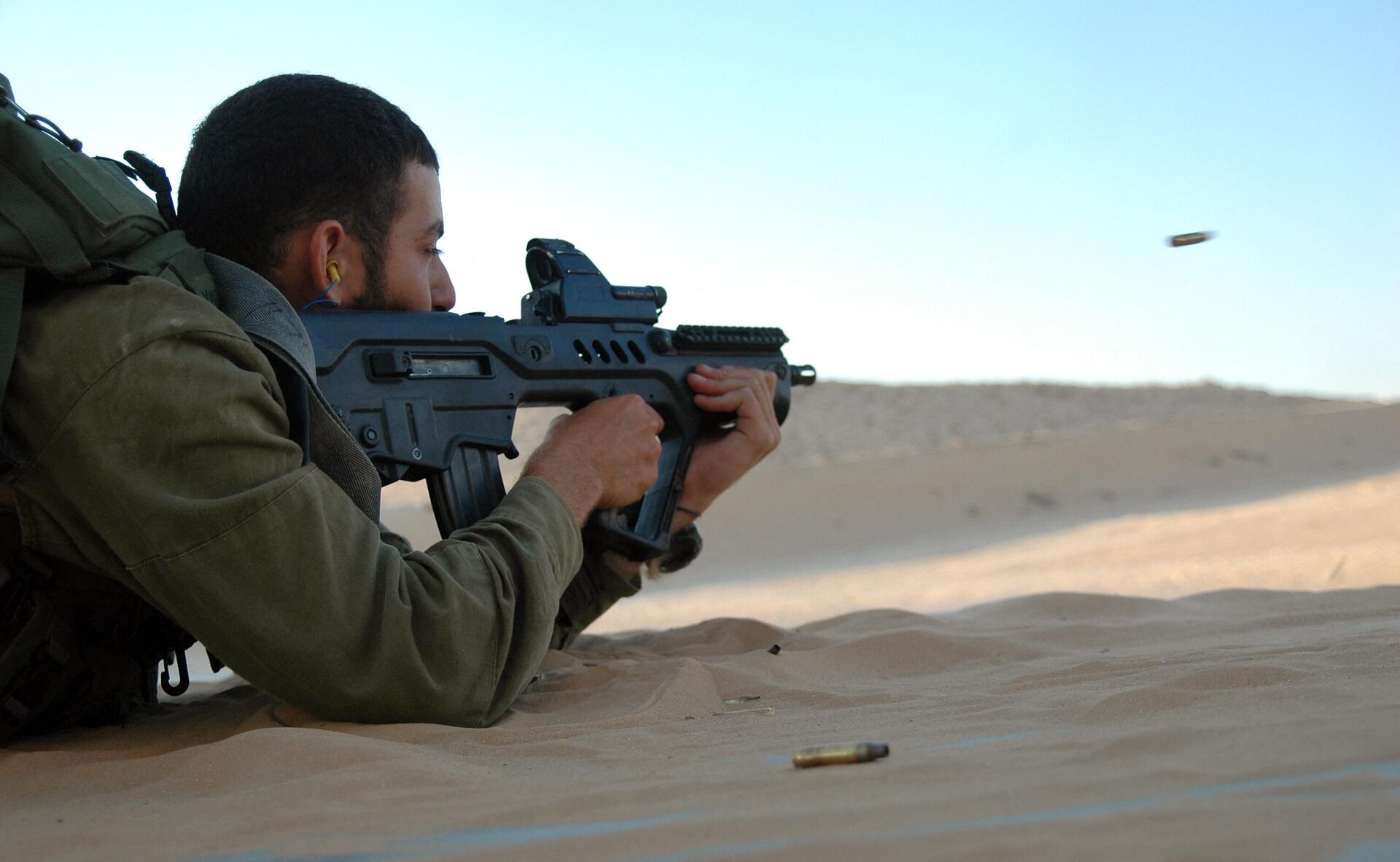
An Israeli soldier fires a TAR-21 weapon, which stands for "Tavor Assault Rifle - 21st Century" at a military shooting range in southern Israel on July 6, 2009.
© AFP 2023 / RON BOUSSO
Israeli Military: Some weapons are deemed too important to be entrusted to any one company, with the Merkava series of main battle tanks being a perfect example. Developed by the Israeli Defense Ministry’s Tank Program Administration (MANTAK), Merkava tanks are produced by the IDF’s Ordnance Corps, with major defense companies producing its components (Rafael providing armor, Elbit Systems-owned IMI the 120 mm smoothbore tank gun, and US defense giant General Dynamics Land Systems the engine and transmission).
A Little Help From Their Friends
With Israeli defense manufacturers capable of producing so many different weapons types – from small arms to tanks and even ballistic missiles, there are only a few areas where Tel Aviv really needs US help – either in actual production or the full cycle of design and manufacturing. For example, the Sa’ar 5-class of Israeli Navy corvettes may have been developed by Israeli defense engineers, but were built by Northrop Grumman subsidiary Ingalls Shipbuilding in Pascagoula, Mississippi. The F-35I Adir fighter is produced by Lockheed Martin at its Fort Worth, Texas plant, with the Israelis then modifying the aircraft to include a custom main computer, and the ability to carry Israeli-made missiles and bombs.
Global Arms Merchants
Building up its domestic defense manufacturing capabilities in the 1970s, 80s, and 90s, Israel has gone on to become a major global arms exporter, with the country estimated to account for some 2.3 percent of global arms sales – 10th in the world overall. Major clients of Israeli weapons include India, Azerbaijan, the United Arab Emirates, Morocco, Bahrain, the United States, and the Philippines. Earlier this year, authorities announced some $12.5 billion in Israeli defense exports in 2022, with drone systems, missiles, rockets, as well as air defenses and radar and early warfare components making up the majority of sales (25 percent, 19 percent, and 13 percent, respectively).
To summarize: if Israeli defense companies remain unaffected by Palestinian militias’ attacks, and if the crisis does not escalate into a major regional conflagration, Israel’s arms industry will quickly be able to provide the IDF with a massive quantitative and qualitative edge over Hamas and its allies –whose weapons-making capabilities are limited almost exclusively to rockets and drones, made from whatever materials are available at underground garages in the Gaza Strip.

